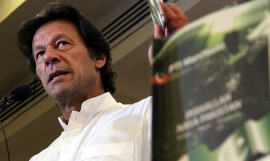
ISLAMABAD:
Forced conversions, arson attacks, enforced displacements, blasphemy allegations, attacks on worship places and killings at the hands of religious extremists; minorities in Pakistan faced all kinds of violence during the last five years. The question is, will the future be any different?
The election manifestos of most mainstream political parties call for a more inclusive society. However, those of some religious groups contain provisions which may be understood as discriminatory, to say the least.
The Muttahida Deeni Muhaaz (MDM), an electoral alliance of five religious parties, states in its manifesto that the president, prime minister, chief justice and heads of other key offices in Pakistan should be male Sunni Muslim.
“Non-Muslims and apostates will be banned from public office jobs in Pakistan,” stipulates the MDM manifesto.
On the other hand, many political parties, including ones with Islamic leanings, hold that plurality and equal opportunities for people of all faiths is essential for Pakistan.
PPP

The Pakistan Peoples Party (PPP) says it will introduce laws to prevent forced conversions and also pledges to pay reparations to victims of religious violence, while also stepping up protection of places of worship.
It also promises to add one more seat in Parliament for Islamabad’s minorities and pledges to revive the National Commission on Minorities as a statutory body. Referring to Salmaan taseer and Shahbaz Bhatti as symbols of the party’s sacrifices for the cause of inclusiveness, it also says it will ask parliament to review constitutional clauses that discriminate on the basis of religion.
JI

Jamaat-e-Islami (JI) promises provision of all constitutional rights and protection to minority communities. They say they will take special care of protecting places of worship and will compensate minorities for any discriminatory or unjust acts against them.
Minorities will be free to practice their respective religious rituals in line with their traditions and norms. The JI, in its manifesto, said that it would lay down easy and convenient procedures for minorities to vote and elect their representatives.
PML-N

The PML-N also pledges to legislate against forced marriage and says that the National Day for Minorities will be celebrated to promote integration, brotherhood and harmony amongst all.
More practically, it also plans to double development funds earmarked for minorities and says will introduce quotas for minorities in educational institutes and public sector jobs. The Christian community will be permitted to run its own schools and colleges.
The PML-N also emphasized that it will expedite the passage of the Hindu Marriage Bill.
JUI-F

Jamiat-e-Ullema-e-Islam-Fazl (JUI-F), in its short 12-page manifesto was very brief on this issue. However, it said that all non-Muslims in the country will enjoy religious freedom, civil rights, and impartial opportunity equal access to justice.
PTI

Saying that it wants to implement Jinnah’s vision of the role of minorities, the PTI makes the claim that its entire manifesto deals with protection against discrimination of all kinds.
Due representation in all state institutions, access to equal economic opportunities and zero tolerance for any abuse or violence against any minority group were the PTI’s key promises to minorities. They say hate speech and inflammatory literature will be banned. Regarding the Ahmadi community, the PTI chief, in a statement, made clear that the 1973 provisions would not be repealed.
ANP

The ANP was short and to-the-point on the treatment of minorities. The ANP will continue efforts to repeal amendments made to the 1973 Constitution which relegate religious minorities to a secondary status, the party manifesto said. Incitement to violence against citizens of other ethnicities, faith and religions will be prohibited. The ANP manifesto stipulated that fusing religion with politics has strengthened and reinforced violent conflicts. “ANP will continue its struggle for a secular, democratic and pluralistic Pakistan with equal rights and opportunities for all citizens,” it added.
MQM

The MQM want to abolish the very use of the term ‘minorities’ and believes their representatives should be elected directly.
The MQM also aims to repeal all existing discriminatory laws against women and non-Muslims, along with providing full freedom of worship, employment and education.
PML-Q

Like the PTI, the Pakistan Muslim League-Quaid (PML-Q) also claims to follow Jinnah’s vision as far as minorities are concerned. The Q-League also shares some of the N-League’s manifesto ideas.
Besides providing all constitutional rights to minorities, they say all steps will be taken to stop misuse of the blasphemy law and all those found guilty of false accusations shall be punished.
PML-Q also promised that it would take steps to stop forced conversions lawfully, ban inflammatory literature, and abolish biased content from school syllabi. A Religious Minorities Bill will be introduced, which will advocate a 5 percent quota for minorities in government jobs.
Published in The Express Tribune, May 4th, 2013.
COMMENTS (16)
Comments are moderated and generally will be posted if they are on-topic and not abusive.
For more information, please see our Comments FAQ





























































Of all the parties, the one I dislike most has the guts to say that they want a "secular, democratic and pluralistic Pakistan with equal rights and opportunities for all citizens,” something I was expecting from PTI.
@Faqir Ipi: That should incldue the funds that is being borrowed from World Bank and IMF
However at the same time, I must say that
Minorities, Women, youths, NGOs are the most important components of Western agenda for (So called) reform.
Those who have devised these agendas of re-form know that if they transform these segments of Muslim society, they do not need to do anything else. Thus, millions of dollars are being spent on initiatives aimed at Muslim youths and women. These include specifically-tailored radio and TV programmes, conferences, economic initiatives, cultural and political activities, and social programmes.
@Mirza Imran Ahsan: While I agree that PTI should have been more bold in their statement and should have used this as an opportunity to show their commitment to minorities as mentioned in their manifesto. I think we need to bring about changes incrementally. Decades of mess can not be fixed in few years. We should first strive to stop prosecution of minorities across the board and ban hate speech. And then incrementally start working towards building the social & cultural bridges to reduce systemic discrimination against minorities. As far as the issue of constitutional amendment and blasphemy laws are concerned, they can be opened up for discussion, but that is realistically at least a decade out. We have to put foundation in place first.If PTI can get the ball rolling on the initial requisite steps, I will still call it a success. At least minorities will be safer than they are today.
The end result will b ZERO.........
Only the ANP's and the MQM's stance seems to be reasonable
@Zeeshan: PTI's recent statement against Ahmadis quite clearly shows that they will buckle under the pressures of Mullahs, so no reason to accept them as saviours. Pakistan is unfortunately becoming a place like Afghanistan a country totally failed on all levels of governance, education, culture and life. Imran Khan's recent so called "calrification" on Ahmadiyya links was a clear indication that his party structures are run by religious extremists unwilling to see things with the prism of justice and rationality.
@ashar: Contrary to perception, in practice the minority as a percentage of the total population has increased steeply in Pakistan. What is the big deal if the Hindus, Ahmedis and Christians have all but been eliminated? The inclusion of Shias, Hazaras, Baluch, etc., has not just compensated the loss but has actually increased the minority population. Pakistan will soon make even more strides with the impending inclusion of Mohajirs in the minority population. Shias are a minority in a country that came to existence because of a Shia.
This is a positive development...at least one good news for the day..."many political parties, including ones with Islamic leanings, hold that plurality and equal opportunities for people of all faiths is essential for Pakistan."
Some selective words of Jinna's dream has come true though. Hindus have ceased to be hindus because most hindu girls have been converted and muslims have ceased to be muslims because these were Bed-N-Book conversions to fulfill the lust and not for the love of the religion. Additionally, after conversions, those who converted have totally disappeared and no one knows of even one of them after their conversion. If the hindu girls converted to marry, they married for love of their man and not love or conviction of religion. Is it difficult to bring out their records from NADRA as to where they are now and are they still married to the same person and still living with him? But who cares? Media, judiciary, political leaders and none from the Muslim population in Pakistan has never asked and shall never ask this basic question for the fear it will bring out the truth.
You are free; you are free to go to your temples, you are free to go to your mosques or to any other place of worship in this State of Pakistan. You may belong to any religion or caste or creed - that has nothing to do with the business of the State...We are starting with this fundamental principle that we are all citizens and equal citizens of one State...I think we should keep that in front of us as our ideal and you will find that in due course Hindus would cease to be Hindus and Muslims would cease to be Muslims, not in the religious sense, because that is the personal faith of each individual, but in the political sense as citizens of the State
Now tell me how many political parties follow these Quaid's words..
I believe minorities are well accommodated in Pakistan, there is no need to beat about the bush.
Sorry guys we minorities will have to fight our own battles. No party will or is capable of protecting us.
whose electoral symbol is "Banana"? :D